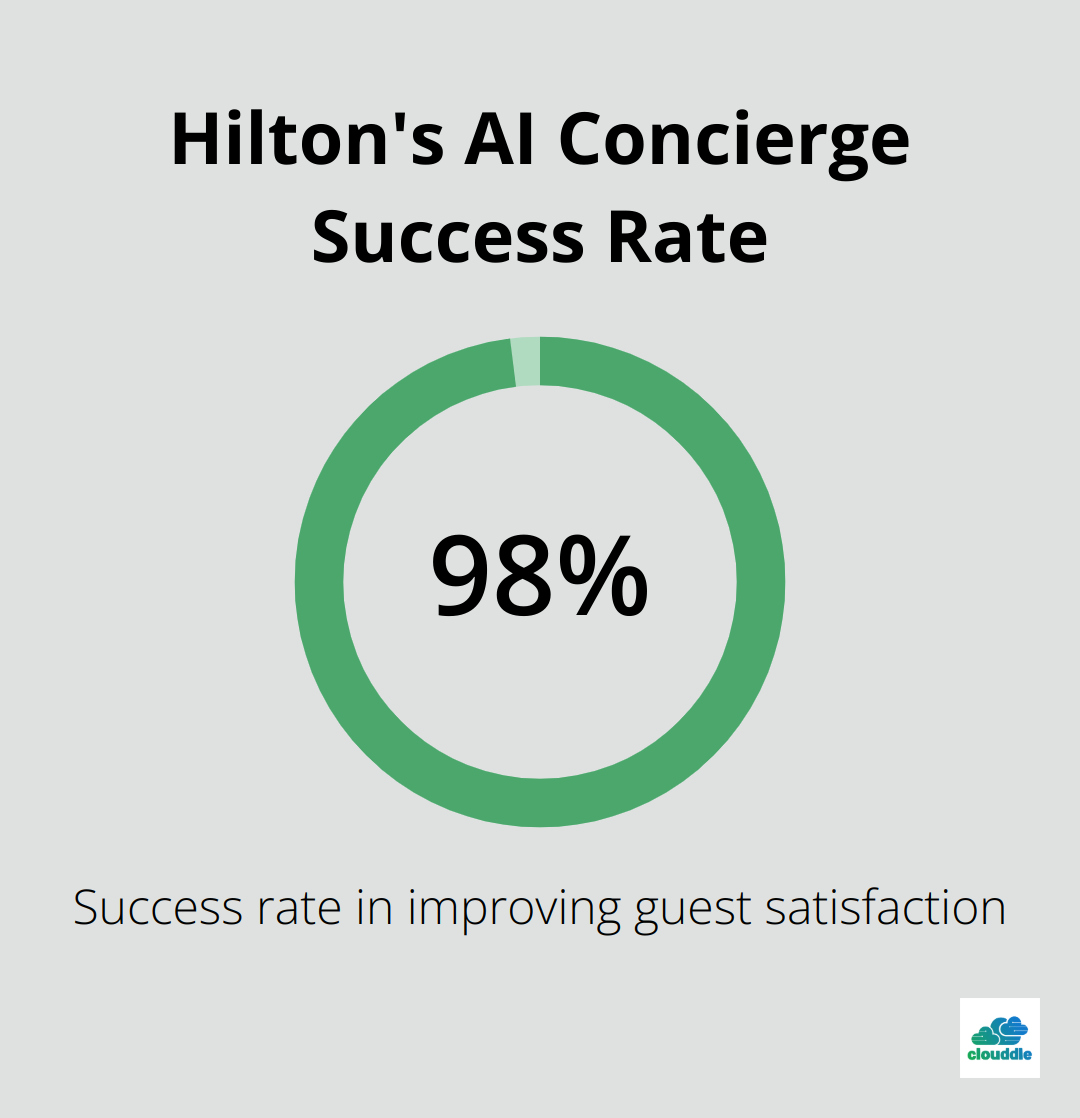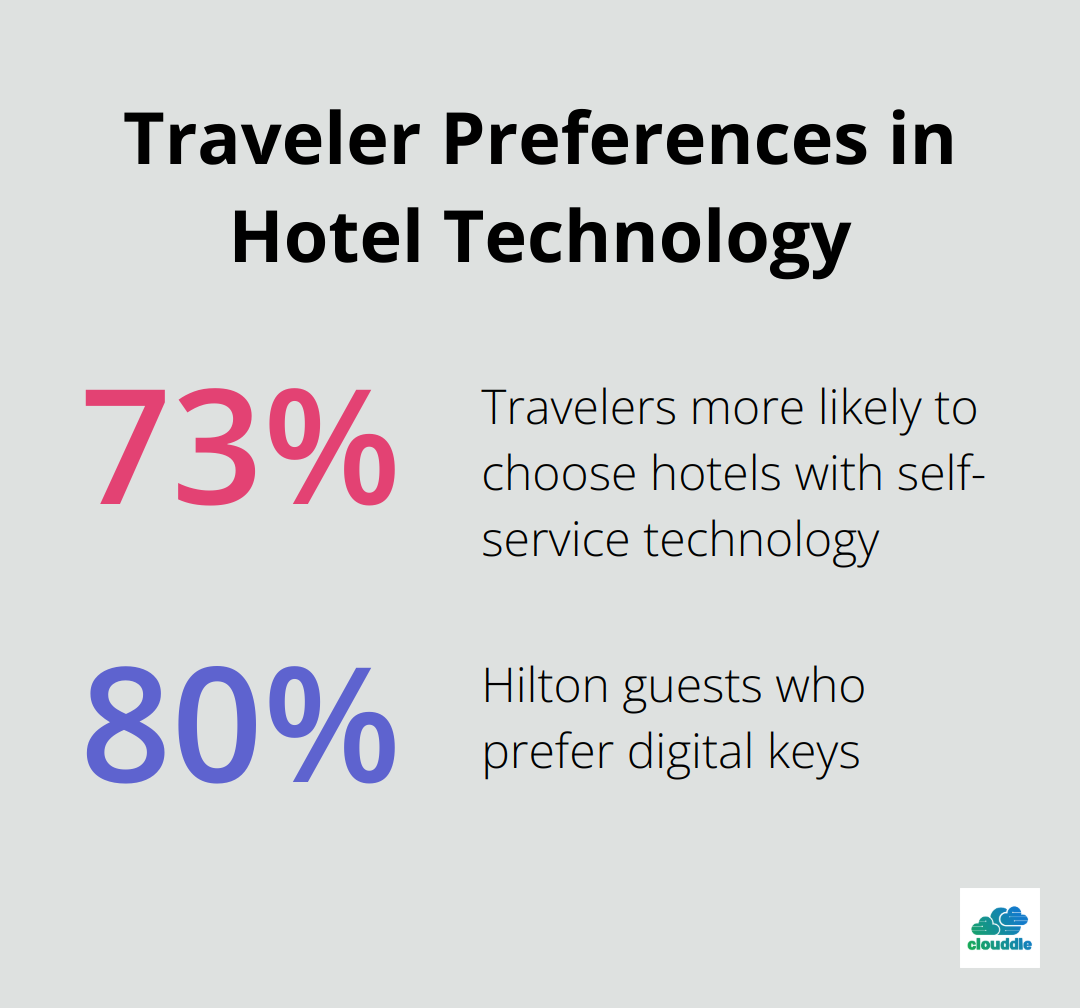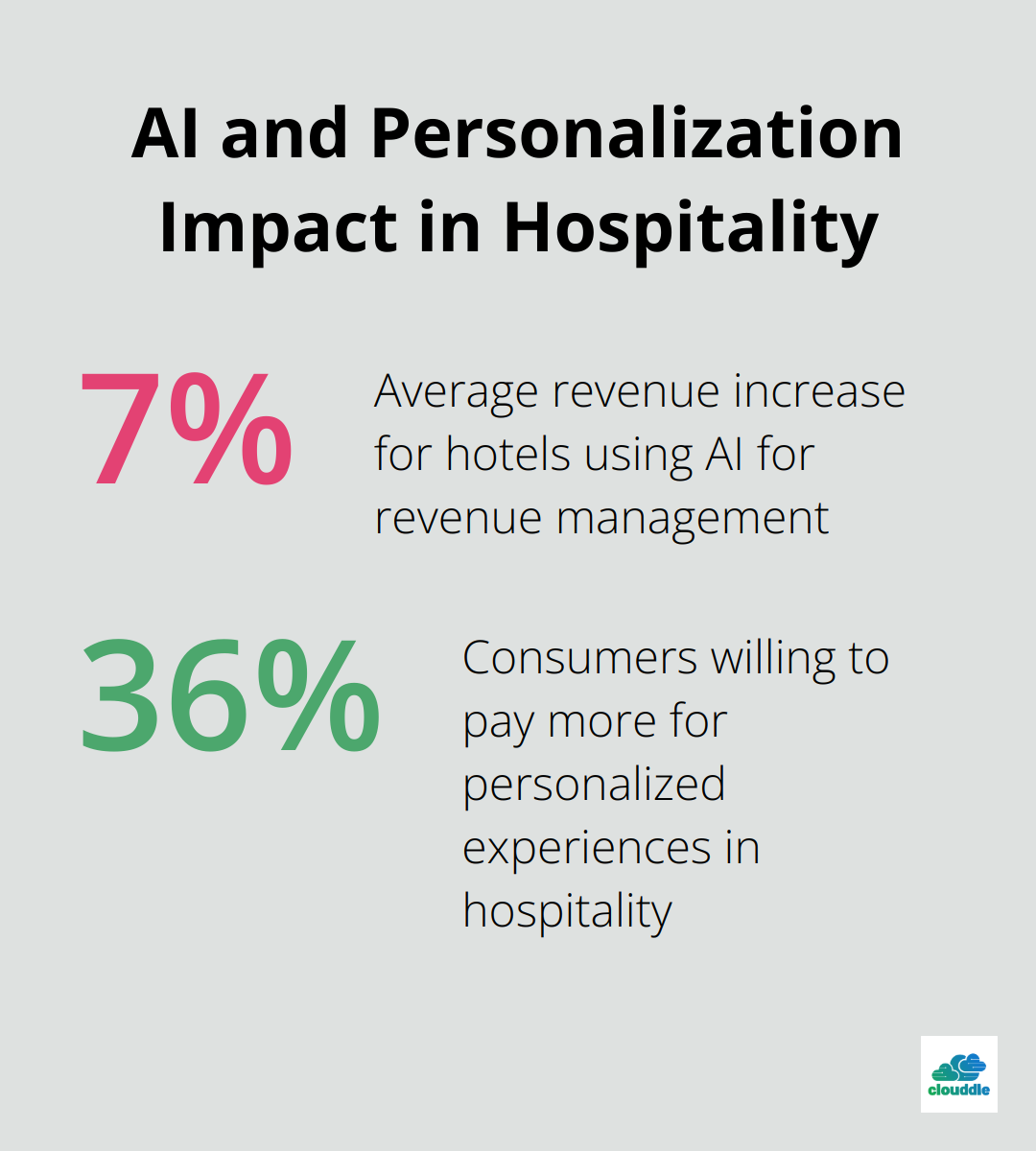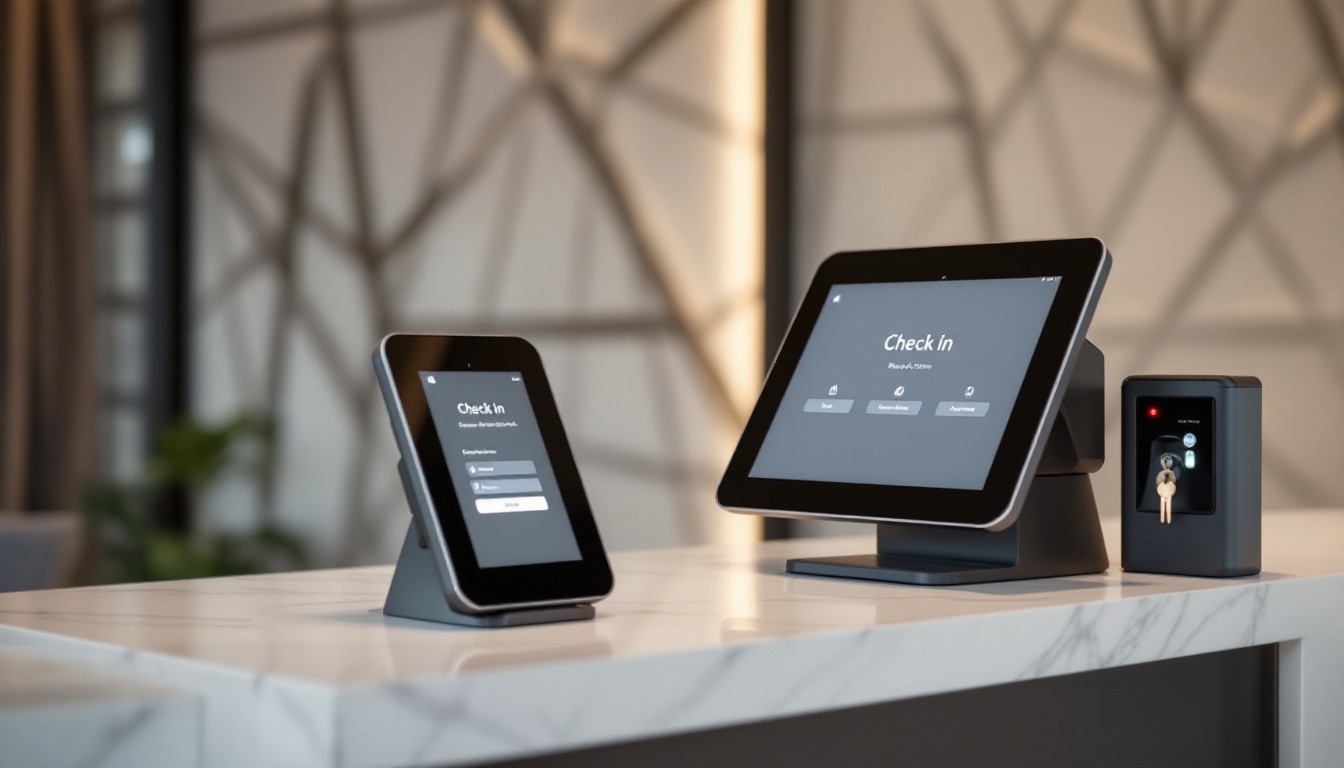The hospitality industry is undergoing a massive transformation, driven by cutting-edge technologies. From smart hotels to mobile apps and AI-powered services, these innovations are reshaping every aspect of the guest experience.
At Clouddle, we’ve witnessed firsthand how the technology impact on the hospitality industry has revolutionized operations and customer satisfaction. This blog post explores the key technological advancements that are defining the future of hospitality.
What Makes a Hotel Smart?
IoT: The Foundation of Intelligent Accommodations
Smart hotels transform the hospitality industry by offering unparalleled comfort, convenience, and personalization. These high-tech accommodations use cutting-edge technologies to enhance every aspect of the guest experience.
The Internet of Things (IoT) serves as the backbone of smart hotel systems. It connects various devices and sensors throughout the property, allowing hotels to collect real-time data on guest preferences and behaviors. This information enables tailored experiences that increase satisfaction and loyalty.
Smart thermostats exemplify this technology in action. When guests enter a room, these devices automatically adjust the temperature to their preferred setting. IoT-enabled minibars track consumption and restock items based on individual guest preferences, further personalizing the stay.
Eco-Friendly Energy Management
Energy management systems revolutionize hotels’ approach to sustainability and cost reduction. These systems employ occupancy sensors and smart algorithms to optimize heating, cooling, and lighting in real-time.
Energy efficiency measures in hotels can drastically reduce costs. This includes simple changes like switching to LED lighting. This reduction not only lowers utility bills but also appeals to environmentally conscious travelers (a growing segment of the market).
Voice-Activated Controls and AI Concierges
Voice-activated room controls continue to gain popularity in smart hotels. Guests adjust lighting, temperature, and even order room service using simple voice commands. This hands-free approach improves convenience and accessibility for all guests.
Artificial intelligence powers virtual concierges, available 24/7 to answer guest queries, make recommendations, and handle requests. These AI assistants communicate in multiple languages, ensuring seamless service for international travelers.
The Hilton chain reports a 98% success rate with their AI concierge “Connie,” demonstrating the effectiveness of this technology in improving guest satisfaction.

The Future of Smart Hotels
While the initial investment in smart hotel technology can be significant, the long-term benefits in operational efficiency, guest satisfaction, and sustainability make it a worthwhile endeavor for forward-thinking hoteliers.
As these technologies evolve, we expect even more innovative solutions to enhance the smart hotel experience. The next frontier in hospitality tech lies in mobile technology, which transforms guest services from check-in to check-out.
Mobile Tech Revolutionizes Hotel Stays
Seamless Check-ins and Keyless Entry
The hospitality industry experiences a seismic shift as mobile technology redefines guest experiences from start to finish. This digital transformation sets a new standard for hotels worldwide.
Long queues at reception desks become a thing of the past. Mobile check-in processes slash wait times dramatically. A report by Oracle and Skift reveals that 73 percent of travelers are more likely to choose a hotel offering self-service technology to minimize wait times.
Keyless entry systems gain rapid traction. Hilton Worldwide reports that 80% of their guests prefer digital keys, citing convenience and security. This technology enhances convenience and improves security by eliminating the risk of lost physical keys.

In-room Services at Your Fingertips
Hotel mobile apps evolve into central hubs for guest services. These apps streamline operations and boost guest satisfaction by offering everything from room service orders to spa treatment bookings. Marriott International’s mobile app saw a 58% increase in food and beverage orders through their mobile platform in 2022 compared to the previous year.
Hotels report that guests who use their mobile apps tend to spend 25% more on additional services during their stay. This increase in revenue highlights the importance of user-friendly, feature-rich mobile platforms for hotels.
Personalized Experiences Through Location Intelligence
Location-based services transform how hotels interact with guests. Hotels leverage GPS data to send targeted offers and recommendations based on a guest’s real-time location within or near the property.
The Cosmopolitan of Las Vegas uses location-based technology to guide guests through the property and provide personalized dining and entertainment suggestions. This level of customization leads to a 30% increase in guest engagement with hotel amenities.
The Future of Mobile Hospitality
Mobile technology reshapes the entire hospitality landscape (not just enhancing guest experiences). As innovation continues in this space, the possibilities for creating memorable, efficient, and personalized hotel stays expand exponentially.
The next frontier in hospitality tech lies in harnessing the power of data and artificial intelligence. These technologies promise to refine mobile-driven experiences further, creating a new era of personalized, efficient, and seamless hotel stays (a topic we’ll explore in depth in our next section).
How AI and Data Transform Hospitality
Smarter Revenue Management
Artificial intelligence (AI) and data analytics revolutionize the hospitality industry. These technologies reshape hotel operations, decision-making processes, and guest interactions.
AI-powered revenue management systems change the game for hotels. This review of twenty-plus years of CQ articles documents the expansion of revenue management themes as published in the Quarterly and suggests directions for future research and practice.
A Cornell University study found that hotels using AI for revenue management increased their revenue by 3-7% on average. This increase translates to millions in additional revenue for larger hotel chains.
Marriott International uses AI to adjust room rates up to 1.7 million times per day across their properties. This dynamic pricing strategy ensures they remain competitive while maximizing revenue.
AI Chatbots Enhance Customer Service
AI-powered personal assistants transform hotel customer service. These virtual assistants handle a wide range of guest inquiries 24/7, from room service orders to local recommendations.
The Cosmopolitan of Las Vegas introduced an AI concierge named Rose, which engages guests in playful conversation while handling their inquiries. This improvement not only reduces response times but also allows staff to focus on more complex guest needs.
Chatbots excel at multilingual support. The Edwardian Hotels London’s chatbot, Edward, communicates in over 50 languages, ensuring seamless service for international guests.
Personalization Through Big Data
Big data analytics enable hotels to create hyper-personalized experiences for guests. Hotels can tailor their services to individual preferences by analyzing data from various touchpoints.
The Dorchester Collection uses AI to analyze guest feedback across their properties. This analysis helped them identify that many guests preferred firmer pillows, leading to a change that increased guest satisfaction scores by 10%.
Hilton’s Connected Room technology uses data from previous stays to automatically set room temperature, lighting, and even TV channels to a guest’s preferences upon arrival.
These personalized experiences drive loyalty. A Deloitte study found that 36% of consumers will pay more for personalized experiences in hospitality.

The Future of AI in Hospitality
The fusion of AI and data analytics in hospitality sets a new standard. Hotels that embrace these technologies will meet evolving guest expectations, optimize their operations, and stay ahead in an increasingly competitive market.
As AI continues to advance, we at Clouddle anticipate even more innovative applications in the hospitality sector. Our solutions (which include managed IT and networking services) help hotels leverage these technologies effectively, ensuring they remain at the forefront of the industry’s digital transformation.
Wrapping Up
The technology impact on the hospitality industry has revolutionized every aspect of guest experiences and hotel operations. Smart hotels, mobile apps, and AI-powered systems have set new standards for personalization and efficiency. These advancements have significantly boosted guest satisfaction and operational effectiveness, leading to increased revenue and loyalty.
The future of hospitality tech promises even more sophisticated personalization and predictive services. Virtual and augmented reality technologies will likely offer immersive experiences for guests before they arrive at a hotel. As these innovations evolve, hotels must stay ahead of the curve to remain competitive in an increasingly tech-driven industry.
Clouddle helps hospitality businesses navigate this digital transformation with our managed IT and networking services. We empower hotels to leverage cutting-edge technologies effectively (ensuring they meet the evolving expectations of modern travelers). The hospitality sector now stands at the beginning of a new era, where technology and traditional hospitality merge to create unparalleled guest experiences.


